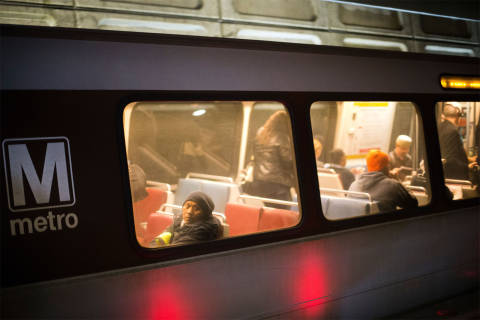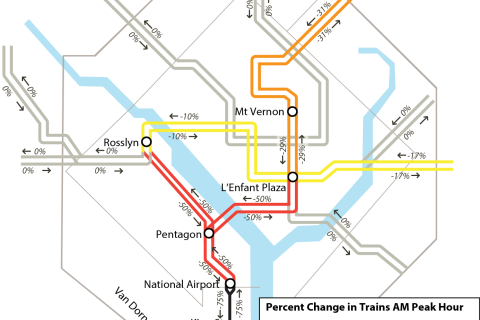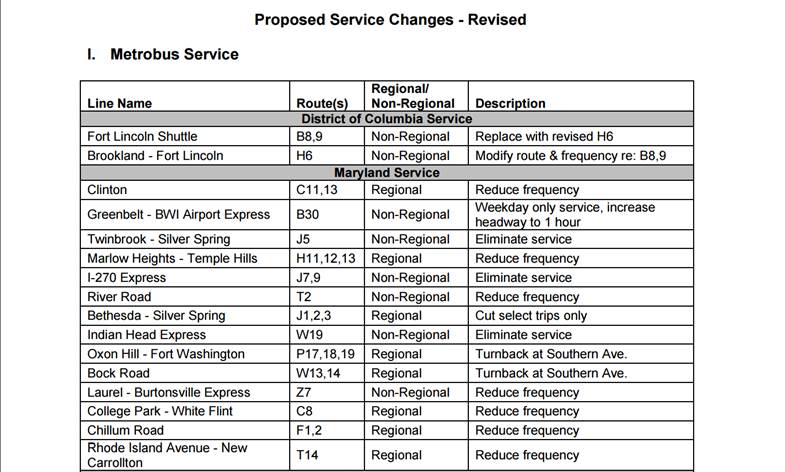
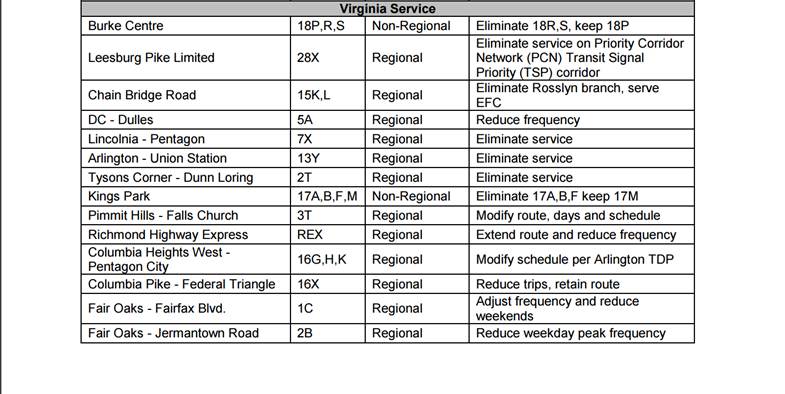
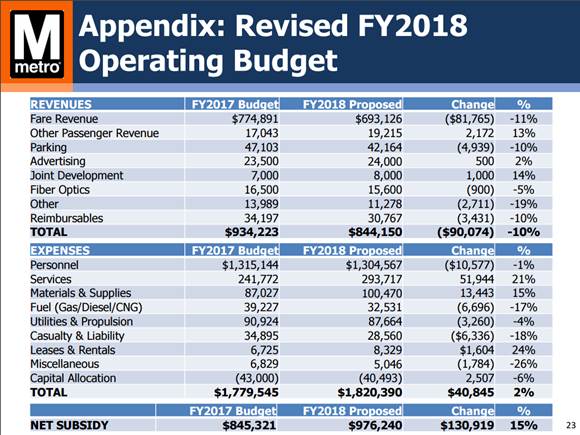
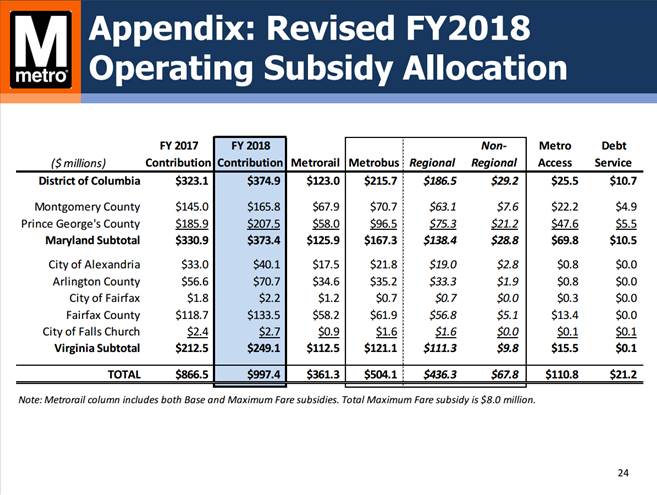
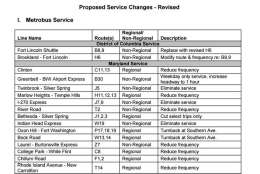
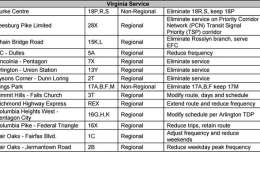
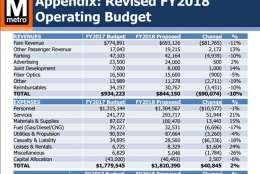
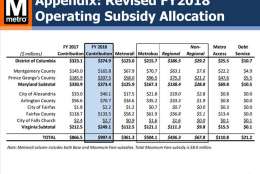
WASHINGTON — Metro plans to raise fares across the board and cut scheduled service on all rail lines at rush hour, beginning around July 1.
Metro General Manager Paul Wiedefeld’s revised budget proposal, set to be approved Thursday by the Metro Board, would raise rail and bus fares and parking fees as initially proposed this fall.
Rail fares would rise 10 cents at rush hour and 25 cents off-peak, including an increase for the maximum rush-hour fare to $6 and the maximum off-peak fare to $3.85. Parking fees would rise 10 cents.
Bus fares will rise 25 cents, to $2. There’s one concession to riders from the original proposal: The seven-day bus pass will remain at $17.50, rather than increasing to match the fare increase. Express Bus fares would rise to $4.25 and airport express buses to Dulles and BWI-Marshall would rise to $7.25.
Overall, Metro hopes the fare increase will raise $21 million, even after accounting for a possible decrease in ridership due to the fare hikes and service cuts.
The proposal maintains rush-hour rail service cuts from the original proposal that would see trains scheduled every eight minutes at the ends of lines rather than every six minutes. More frequent service would be scheduled downtown, and where lines overlap.
The budget plan removes proposed rail service cuts at off-peak hours, which would have reduced scheduled service on nights and weekends; however, Metro often cuts service at those times anyway, citing track work needs.
The revised proposal promises to increase the percentage of eight-car trains “when possible,” and to make extra trains available to handle rush-hour crowding on the Orange and Green lines.
Bus cuts
The plan restores some bus routes in Maryland and Virginia that had been on the chopping block, but several have less-frequent service.
In D.C., the B8 and B9 would be cut and replaced with a revised H6 route in the Fort Lincoln area.
In Maryland, the J5 Twinbrook-Silver Spring, the J7 and J9 I-270 Express routes and the W19 Indian Head Express are completely cut.
The B30 bus to BWI-Marshall from Greenbelt would be reduced to once an hour, and on weekdays only.
The P17, P18 and P19 Oxon Hill-Fort Washington routes and the W13 and W14 Bock Road routes would remain in operation, but turn back at Southern Avenue station.
Other Maryland routes that would run less frequently overall, but would remain in service:
- C11 and C13 Clinton line
- H11, H12 and H13 Marlow Heights-Temple Hills line
- T2 River Road line
- J1, J2 and J3 Bethesda-Silver Spring line
- Z7 Laurel-Burtonsville Express
- C8 College Park-White Flint line
- F1 and F2 Chillum Road lines
- T14 Rhode Island Ave.-New Carrollton line
For Virginia¸ the proposal contains a mix of complete route eliminations and tweaks to existing routes.
The 5A bus between D.C., Rosslyn and Dulles Airport would run less frequently.
Virginia routes completely eliminated are:
- 2T Tysons Corner — Dunn Loring
- 13Y Arlington-Union Station
- 7X Lincolnia-Pentagon
Virginia routes eliminated with some overlapping service remaining:
- 17A, 17B and 17F to be eliminated; 17M Kings Park route to remain in service
- 18R and 18S Burke Centre lines to be eliminated; 18P route to remain in service
- 28X Leesburg Pike Limited bus between the Mark Center and East Falls Church to be eliminated; overlapping service remains
Other Virginia routes with reduced or modified service that would remain in operation:
- 15K and 15L Chain Bridge Road Line would serve East Falls Church, but not Rosslyn
- 3T Pimmit Hills-Falls Church line would have a modified route, days and schedule
- REX Richmond Highway Express would have an extended route but reduced frequency
- 16G, 16H and 16K Columbia Heights West-Pentagon City line would have modified schedules to match Arlington County’s plans for the area
- 16X Columbia Pike-Federal Triangle line would have reduced trips
- 1C Fair Oaks-Fairfax Boulevard Line would have reduced service on weekends as part of a new schedule
- 2B Fair Oaks-Jermantown Road would run less often at rush hour
Those changes mean that all MetroAccess riders who are eligible for service by virtue of living close enough to a bus route will continue to receive paratransit service. MetroAccess fares would remain capped at a maximum of $6.50.
The budget plan also includes some additional late-night bus service for riders left out by the coming change in rail hours. Starting July 1, Metro will close at 11:30 p.m. on weeknights (30 minutes earlier than today), at 1 a.m. Friday and Saturday nights (closing time has been at midnight since June), and at 11 p.m. Sundays (one hour earlier than today). The system will also open at 8 a.m. Sundays, rather than the present 7 a.m.
Overall, the restoration of scheduled service that had initially been cut out of the budget means Metro now plans to eliminate 142 rail and bus jobs tied to service cuts, rather than the 300 initially proposed.

